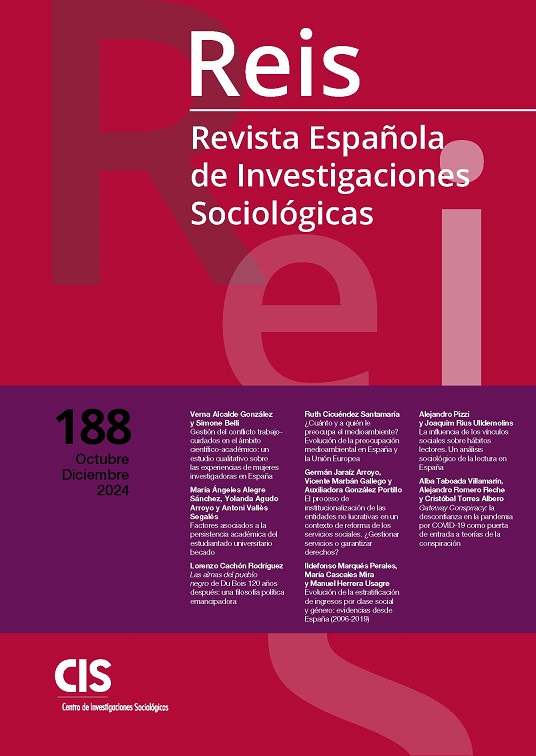The Influence of Social Connections on Reading Habits: A Sociological Analysis of Reading in Spain
DOI:
https://doi.org/10.5477/cis/reis.188.121-144Keywords:
Books Consumption, Social Inequality, Social Factors, Reading, Cultural Practices, Social BondsAbstract
This article addresses the study of reading habits in Spain, a central aspect of cultural consumption that has received little academic attention. Through a multivariate and ordinal regression analysis, we investigate how various structural, cultural, and attitudinal factors influence these habits. We particularly highlight the significant influence of social connections (such as family, the educational environment, and friendships) in the formation of reading habits. This provides a perspective that goes beyond the simplified division between reader/non-reader and previous analysis focused on elitist distinctions. The findings suggest that variations in cultural reading consumption are more closely linked to differences in social environments and their relationship with culture than to socioeconomic condition or individuals’ educational level.
Downloads
References
Alvermann, Donna E. (2002). «Effective Literacy Instruction for Adolescents». Journal of Literacy Research, 34(2): 189-208. DOI: https://doi.org/10.1207/s15548430jlr3402_4
Ariño-Villarroya, Antonio (2010). Prácticas culturales en España: desde los años sesenta hasta la actualidad. Barcelona: Ariel.
Ariño-Villarroya, Antonio y Llopis, Ramón (2016). La participació cultural de la joventut catalana: 2001-2015. Barcelona: Generalitat de Catalunya.
Bennett, Tony; Savage, Mike; Silva, Elizabeth; Warde, Alan; Gayo-Cal, Modesto y Wright, David (2010). Culture, class, distinction. London: Routledge. DOI: https://doi.org/10.4324/9780203930571
Bourdieu, Pierre (1998). La distinción. criterios y bases sociales del gusto. Madrid: Taurus.
Chan, Tak W. y Goldthorpe, John H. (2007). «Social Stratification and Cultural Consumption: Music in England». European Sociological Review, 23(1): 1-19. DOI: https://doi.org/10.1093/esr/jcl016
CIS (1998). Tiempo libre y hábitos de lectura. Estudio n.º 2280. Madrid: Centro de Investigaciones Sociológicas.
CIS (2003). Tiempo libre y hábitos de cultura, II. Estudio n.º 2478. Madrid: Centro de Investigaciones Sociológicas.
CIS (2016). Barómetro de septiembre. Estudio n.º 3149. Madrid: Centro de Investigaciones Sociológicas.
DiMaggio, Paul (1987). «Classification in Art». American Sociological Review, 52(4): 440-455. DOI: https://doi.org/10.2307/2095290
DiMaggio, Paul y Mukhtar, Toqir (2004). «Arts Participation as Cultural Capital in the United States, 1982-2002: Signs of Decline?» Poetics, 32(2): 169-194. doi: 10.1016/j.poetic.2004.02.005 DOI: https://doi.org/10.1016/j.poetic.2004.02.005
Donnat, Olivier (2004). «Les univers culturels des français». Sociologie et Societés, 36-1: 87-103. DOI: https://doi.org/10.7202/009583ar
Fabiani, Jean-Louis (2007). Après la culture légitime. objets, publics, autorités. Paris: L'Harmattan.
Falk, Martin y Katz-Gerro, Tally (2016). «Cultural Participation in Europe: Can We Identify Common Determinants?». Journal of Cultural Economics, 40(2): 127-162. DOI: https://doi.org/10.1007/s10824-015-9242-9
Fishman, Robert M. y Lizardo, Omar (2013). «How Macro-historical Change Shapes Cultural Taste: Legacies of Democratization in Spain and Portugal». American Sociological Review, 78(2): 213-239. DOI: https://doi.org/10.1177/0003122413478816
Knulst, Wim y Broek, Andries van den (2003). «The Readership of Books in Times of De-reading». Poetics, 31(3): 213-233. DOI: https://doi.org/10.1016/S0304-422X(03)00031-7
Labari, Brahim (2014). Ce que la sociologie fait de la littérature et vice-versa. Paris: Publibook.
Lahire, Bernard (2004). La culture des individus. dissonances culturelles et distinction de soi. Paris: La Découverte.
Lahire, Bertrand (2008). «The Individual and the Mixing of Genres: Cultural Dissonance and Self-distinction». Poetics, 36(2-3): 166-188. doi: 10.1016/j.poetic.2008.02.001 DOI: https://doi.org/10.1016/j.poetic.2008.02.001
Levmore, Saul y Nussbaum, Martha (2011). The Offensive Internet. Cambridge (MA): Harvard University Press. DOI: https://doi.org/10.4159/9780674058767
Lizardo, Omar (2006). «How Cultural Tastes Shape Personal Networks». Am Sociol Rev, 71(5): 778-807. DOI: https://doi.org/10.1177/000312240607100504
Lizardo, Omar (2017). «Improving Cultural Analysis: Considering Personal Culture in Its Declarative and Nondeclarative Modes». Am Sociol Rev, 82(1): 88-115. DOI: https://doi.org/10.1177/0003122416675175
Mauger, Gérard y Poliak, Claude F. (2000). «Lectures: Masculin/feminin». Regards Sociologiques, (19): 115-140.
Mauger, Gérard; Poliak, Claude y Pudal, Bernard (2010). Histoires de lecteurs. Vulaines-sur-Seine: Editions du Croquant.
Miller, Donalyn (2009). The Book Whisperer: Awakening the Inner Reader in Every Child. New York: John Wiley & Sons.
Noya, Javier (2010). Sociología de la creatividad. En: J. Noya; F. del Val y C. M. Pérez-Colman (eds.). Musyca. Música, sociedad y creatividad artística (pp. 19-40). Madrid: Biblioteca Nueva.
Ollivier, Michèle (2008). «Modes of Openness to Cultural Diversity: Humanist, Populist, Practical, and Indiferent». Poetics, 36(2):120-147. doi: 10.1016/j.poetic.2008.02.005 DOI: https://doi.org/10.1016/j.poetic.2008.02.005
Patricio-Mulero, Maria (2019). «The Literary City: Identities, Urban Spaces, and Literary Fields in the 20th and 21st Centuries». Debats. Revista de Cultura, Poder i Societat, 3(0): 129-133.
Peterson, Richard A. y Kern, Roger M. (1996). «Changing Highbrow Taste: From Snob to Omnivore». American Sociological Review, 61(5): 900-907. DOI: https://doi.org/10.2307/2096460
Pizzi, Alejandro; Pecourt, Juan y Rius-Ulldemolins, Joaquim (2023). «De la “brecha digital” al control de internet. Usos, actitudes y participación digital en España». Revista Española de Sociología, 32(3): a178. DOI: https://doi.org/10.22325/fes/res.2023.178
Radway, Janine (1984). Reading the Romance. Women, Patriarchy, and Popular Literature. London: Verso.
Rius-Ulldemolins, Joaquim; Pizzi, Alejandro y Rubio-Arostegui, Juan A. (2019). «European Models of Cultural Policy: Towards European Convergence in Public Spending and Cultural Participation?». Journal of European Integration, 41(8): 1045-1067. DOI: https://doi.org/10.1080/07036337.2019.1645844
Rius-Ulldemolins, Joaquim y Pizzi, Alejandro (2022). «Cultural Policy Regimes and Arts Councils. The longue durée perspective, birth of the State, religious trajectories and national cultural policies». International Journal of Cultural Policy, 28(1): 17-33. doi: 10.1080/10286632.2021.1883597 DOI: https://doi.org/10.1080/10286632.2021.1883597
Rius-Ulldemolins, Joaquim, Pizzi, Alejandro y Paya, Raul (2022). «Religion as a Factor in Cultural Consumption: Religious Denomination and Its Impact on Reading Practices and Ballet-opera Attendance in Europe». International Journal of Comparative Sociology, 64-3: 00207152221118627. DOI: https://doi.org/10.1177/00207152221118627
Toivonen, Timo (2013). «Cohorts and Reading Time on the Basis of the Finnish Time Use Data 1979-2009». Finnish Journal of Social Research, 6: 15-23. DOI: https://doi.org/10.51815/fjsr.110716
Verboord, Marc (2005). «Long-term Effects of Literary Education on Book-reading Frequency: An Analysis of Dutch Student Cohorts 1975-1998». Poetics, 33(5): 320-342. DOI: https://doi.org/10.1016/j.poetic.2005.09.007
Vincent, David (2000). The Rise of Mass Literacy: Reading and Writing in Modern Europe. Cambridge: Polity.
Weingartner, Sebastian (2020). «Digital Omnivores? How Digital Media Reinforce Social Inequalities in Cultural Consumption». New Media & Society, 23(11): 3370-3390. doi: 10.1177/1461444820957635 DOI: https://doi.org/10.1177/1461444820957635
Downloads
Published
How to Cite
Issue
Section
License
Copyright (c) 2024 Revista Española de Investigaciones Sociológicas

This work is licensed under a Creative Commons Attribution-ShareAlike 4.0 International License.
Permite Compartir — copiar y redistribuir el material en cualquier medio o formato, Adaptar — remezclar, transformar y construir a partir del material para cualquier propósito, incluso comercialmente.








